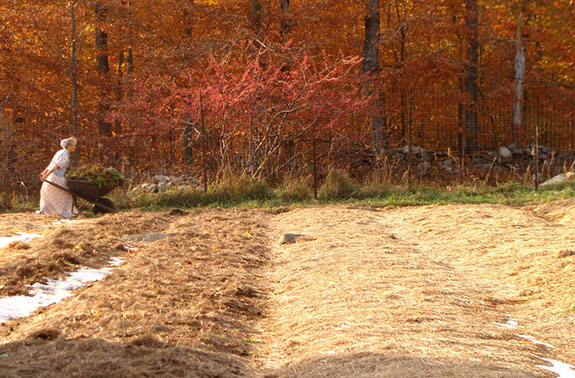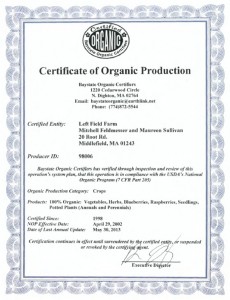Our Certified Organic Market Garden
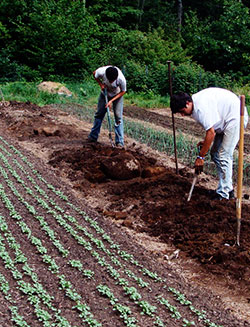 Working with well-drained, stony New England soils, we chose to use hand tools and people power to manage our farm. Rather than the sounds of the internal combustion engine, the sounds at Left Field Farm are of quiet industry: the songs of woodland birds, the buzz of insects at work, the whisper of a breeze through the trees and the conversations of people at work. We tend our garden with hoes, rakes and spades. The chores of transplanting, thinning and harvesting are also all done by hand. The non-cultivated edges surrounding the garden are scythed and the cuttings are used to mulch some parts of the garden.
Working with well-drained, stony New England soils, we chose to use hand tools and people power to manage our farm. Rather than the sounds of the internal combustion engine, the sounds at Left Field Farm are of quiet industry: the songs of woodland birds, the buzz of insects at work, the whisper of a breeze through the trees and the conversations of people at work. We tend our garden with hoes, rakes and spades. The chores of transplanting, thinning and harvesting are also all done by hand. The non-cultivated edges surrounding the garden are scythed and the cuttings are used to mulch some parts of the garden.
The forest habitat of the farm is home to many woodland and forest edge dwelling bird species. An abundant supply of native caterpillars and garden insects provide food for hungry, rapidly growing nestlings and fledglings. By autumn the leafy garden is flush with migrating birds seeking shelter from predatory birds and foraging for food to fuel their travel. These birds are one of our main allies in pest control. We accept that some pests will always be present so that insect eating birds will be enticed into the garden.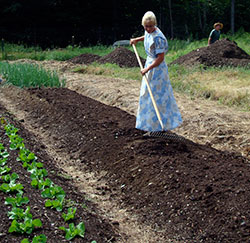 Those hungry birds keep the insect population in check, aiding our goal of having a balanced farm ecology.
Those hungry birds keep the insect population in check, aiding our goal of having a balanced farm ecology.
Our management techniques afford us the ability to ‘close crop’ and maximize yield, put us amidst our crops, continuously monitoring their health, noticing any unwelcome insects so that we can dispatch them quickly by hand.
The soil we have built through yearly applications of farm-made compost and mulch is rich in organic matter. At the close of each growing season crop residue is removed from the beds that are then hoed one final time. Mulch hay is applied to the entire garden to protect the topsoil from scouring by winter 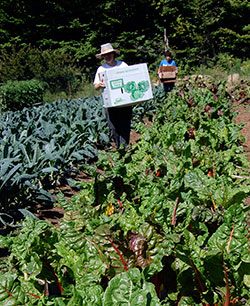 winds and to discourage the sprouting of weed seeds the next spring. This regimen provides fertile ground for producing high yielding, robust, healthy, full flavored and disease free crops.
winds and to discourage the sprouting of weed seeds the next spring. This regimen provides fertile ground for producing high yielding, robust, healthy, full flavored and disease free crops.
